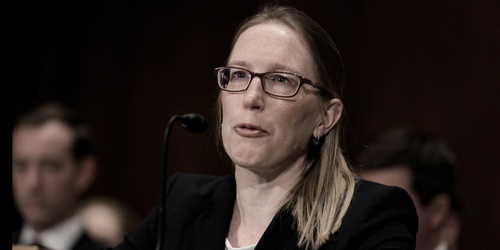SEC Commissioner Hester Peirce announced her “Token Safe Harbor Proposal” on Thursday, calling it “a proposal to fill the gap between regulation and decentralization.” Her “Proposed Securities Act Rule 195 – Time-limited exemption for tokens” seeks to give issuers a three-year exemption from federal securities laws, allowing them to develop functional or decentralized networks.
U.S. Securities and Exchange Commission (SEC) Commissioner Hester Peirce has formally proposed a grace period of three years for tokens. Project developers would be exempt from the federal securities laws during that time, provided that they meet certain conditions.
After that, they must determine whether their token transactions involve the offer or sale of a security.
Proposed ‘Time-Limited Exemption for Tokens’
“I find decentralized networks such a powerful phenomenon, and one that will allow society to benefit from the talents of people who – because of societal or geographic barriers – have heretofore been excluded”, the commissioner opined. Peirce is often known within the crypto community as “crypto mom”, having repeatedly advocated for cryptocurrency. She firmly believes that the SEC should have already approved bitcoin exchange-traded funds (ETFs). She has been an SEC commissioner since 2018 and her term expires this year.

SEC Commissioner Hester Peirce
While no registered token offering has been conducted in the U.S., there are currently some exemptions available to project developers, such as those provided by Regulation D and Regulation A. However, Peirce pointed out that the two routes are costly and prohibitive, making it difficult for projects’ networks to take off.
Expressing the need for her proposal, the commissioner said that many crypto entrepreneurs are trying to build decentralized networks and need to get their tokens into the hands of other people. “These efforts can be stymied by concerns that such efforts may fall within the ambit of federal securities laws”, she emphasized. “The fear of running afoul of the securities laws is real. Given the SEC’s enforcement activity in this area, these fears are not unfounded.”
3-Year Grace Period
Commissioner Peirce explained that her proposed safe harbor “provides network entrepreneurs sufficient time to build their networks before having to measure themselves against a decentralization or functionality yardstick”, elaborating:
The safe harbor would provide network developers with a three-year grace period within which they could facilitate participation in and the development of a functional or decentralized network, exempted from the registration provisions of the federal securities laws, so long as the conditions are met.
Her proposal also “protects token purchasers by requiring disclosures tailored to their needs, preserving the application of the antifraud provisions of the securities laws, and giving them an ability to participate in networks of interest to them”, she claims.
The offer and sale of tokens would be exempt from the provisions of the Securities Act of 1933, except the antifraud provisions, Peirce detailed. The tokens would also be exempt from registration under the Securities Exchange Act of 1934 and persons engaged in certain token transactions from the definitions of “exchange”, “broker”, and “dealer” under the 1934 Act. The development team must meet certain conditions, including information disclosure to qualify for the exemptions.
When the Grace Period Is Up
The initial development team must intend for the project to reach network maturity within three years. The relief provided “will expire three years from the date of the first token sold in reliance upon the safe harbor”, the proposal states. “Upon the conclusion of the three-year period, the initial development team must determine whether token transactions involve the offer or sale of a security.”
Peirce described that token transactions would not be securities “if the network has matured into a decentralized or functioning network on which the token is in active use for the exchange of goods or services.” She believes that it would be easier for these projects to pass the SEC’s Howey test for securities at the end of three years, adding:
Once the network cannot be controlled or unilaterally changed by any single person, entity, or group of persons or entities under common control, the token that operates on that network will not look like a security.
“Even for a network that remains centralized”, the commissioner continued. “Once the tokens are actually in use to buy and sell the services for which they were intended, the securities laws will be clearly inapplicable.”

